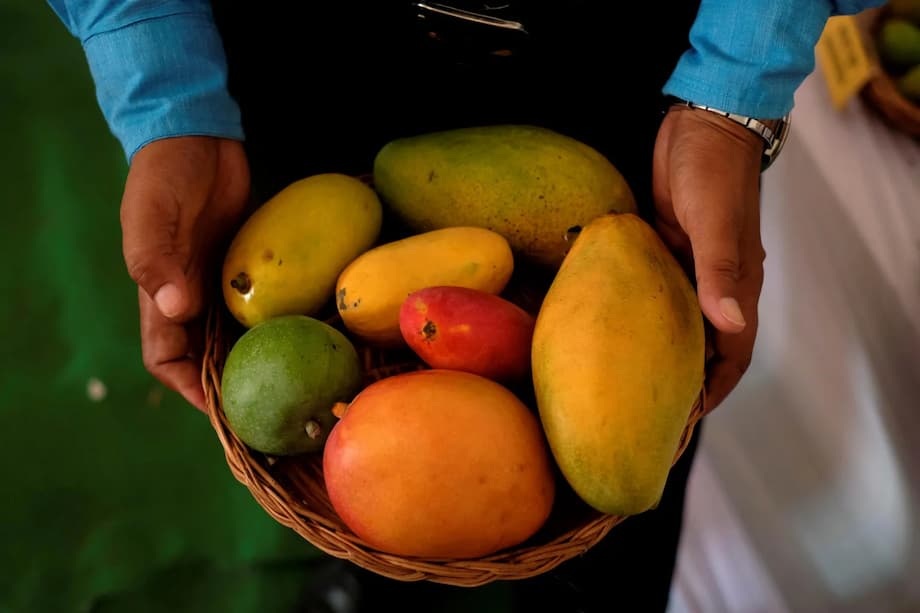Can People with Diabetes Eat Mangoes? New Indian Studies Offer Surprising Answers
Every summer, as mangoes flood Indian markets and homes, a familiar question arises among millions living with diabetes: Is it safe to eat mangoes? For decades, conventional wisdom and medical advice have warned diabetics to avoid this beloved fruit due to its natural sweetness. Yet, new clinical research from India is rewriting the narrative, suggesting that, when eaten in moderation and as a substitute for other carbohydrates, mangoes may not only be safe but could actually benefit people with type 2 diabetes.
- Can People with Diabetes Eat Mangoes? New Indian Studies Offer Surprising Answers
- Why Were Mangoes Considered Off-Limits for Diabetics?
- What Did the New Indian Clinical Trials Find?
- How Do Mangoes Affect Blood Sugar Compared to Other Carbohydrates?
- What Is the Right Way for Diabetics to Eat Mangoes?
- Why Might Mangoes Offer Metabolic Benefits?
- The Cultural and Social Significance of Mangoes in India
- What Are the Broader Implications for Diabetes Management?
- In Summary
This article explores the latest scientific findings, expert opinions, and the cultural significance of mangoes in India, offering a comprehensive look at how this iconic fruit fits into diabetes management today.
Why Were Mangoes Considered Off-Limits for Diabetics?
Mangoes are renowned for their juicy sweetness and rich flavor, making them a staple of Indian summers and a symbol of celebration. However, their high natural sugar content has long led to their exclusion from diabetic diets. The fear was simple: eating mangoes would cause dangerous spikes in blood sugar, worsening diabetes control and increasing the risk of complications.
Type 2 diabetes, which accounts for over 90% of global diabetes cases, is a chronic condition where the body either resists the effects of insulin or doesn’t produce enough of it. This leads to elevated blood sugar levels, which, over time, can damage organs and increase the risk of heart disease, stroke, and other serious health issues. India is home to an estimated 77 million adults with type 2 diabetes, and another 25 million are considered prediabetic. For these individuals, managing blood sugar is a daily challenge, and diet plays a crucial role.
What Did the New Indian Clinical Trials Find?
Two landmark clinical studies conducted by Fortis C-DOC Hospital for Diabetes and Allied Sciences, in collaboration with the National Diabetes, Obesity and Cholesterol Foundation (N-DOC) and supported by the Indian Council of Medical Research, have challenged the old assumptions about mangoes and diabetes.
The first study involved 95 participants, both with and without type 2 diabetes. Each was given either 250 grams of mango pulp (from popular Indian varieties like Safeda, Dasheri, or Langra) or an equivalent-calorie portion of white bread. Researchers used oral glucose tolerance tests and continuous glucose monitoring over three days to track blood sugar responses.
The results were striking: mangoes produced similar or even lower glycemic responses than white bread. In people with diabetes, the mean amplitude of glycemic excursion—a key marker for blood sugar spikes—was lower after eating mangoes compared to bread. This suggests that mangoes, despite their sweetness, do not cause the rapid blood sugar surges that refined carbohydrates do.
The second study was an eight-week randomized controlled trial involving 35 adults with type 2 diabetes. Participants were divided into three groups: one consumed 250 grams of Safeda mango daily, another Dasheri mango, and the third an equivalent amount of white bread, all at breakfast. The mango groups showed significant improvements in:
- Fasting blood glucose
- Glycosylated hemoglobin (HbA1c, a long-term marker of blood sugar control)
- Insulin resistance (measured by HOMA-IR)
- Body weight and waist circumference
- Skinfold thickness (a measure of body fat)
- High-density lipoprotein (HDL, or “good” cholesterol)
In contrast, the bread group did not experience these benefits, and in some cases, markers worsened.
Expert Commentary: What Do the Researchers Say?
Dr. Sugandha Kehar, first author of both studies, explained that these findings challenge the long-held belief that mangoes are unsafe for diabetics. She stated:
“Within prescribed diets, consumption of mangoes is not detrimental to blood glucose and may even be beneficial.”
Professor Anoop Misra, senior author and chairman of Fortis C-DOC, emphasized moderation and clinical supervision:
“We showed the benefits of small doses of mangoes in place of carbohydrates (bread) in breakfast in two detailed studies for the first time, laying to rest all speculations regarding adverse metabolic effects of its consumption. But the key is moderation and clinical supervision—this is not a licence for unlimited mango feasts.”
How Do Mangoes Affect Blood Sugar Compared to Other Carbohydrates?
One of the most important findings from these studies is that mangoes have a low-to-medium glycemic index (GI), typically around 51, which is much lower than white bread or sugary snacks. The glycemic index measures how quickly a food raises blood sugar levels. Foods with a high GI cause rapid spikes, while those with a low or medium GI result in slower, more gradual increases.
Mangoes are also rich in dietary fiber, vitamins (such as vitamin C and vitamin A), and plant compounds like polyphenols and carotenoids. These nutrients not only slow down the absorption of sugar but also have anti-inflammatory and antioxidant properties, which may help improve insulin sensitivity and reduce the risk of diabetes complications.
In the clinical trials, replacing bread with mangoes led to better glycemic stability, less variability in blood sugar levels, and improvements in metabolic health markers. This suggests that, when eaten as a substitute for other carbohydrates rather than as an extra, mangoes can be part of a healthy, balanced diet for people with diabetes.
What Is the Right Way for Diabetics to Eat Mangoes?
While the new research is encouraging, experts caution that mangoes should not be consumed indiscriminately. The studies were conducted under strict dietary supervision, with mangoes replacing other carbohydrate sources and within calorie-restricted meal plans.
Key Guidelines for Including Mangoes in a Diabetic Diet
- Portion control is crucial: The studies used 250 grams of mango per day (about one small mango), replacing an equivalent amount of bread or other carbohydrates.
- Do not add mangoes on top of your usual diet: Mango calories should be part of your daily limit, not extra.
- Eat mangoes between meals: Pairing mango with a source of protein or fiber (like nuts or yogurt) can further slow sugar absorption.
- Avoid mango juices, milkshakes, or sugary preparations: These forms concentrate sugar and remove fiber, leading to higher blood sugar spikes.
- Consult your doctor or dietitian: Any changes to your diet should be made under professional supervision, especially if you have diabetes or other health conditions.
Dr. Rahul Baxi, a Mumbai-based diabetologist, advises:
“Patients with controlled glucose can consume mango in limited amounts, equal to about 15g of carbohydrates, once or twice a day. Eat mango between meals, paired with protein or fiber, and avoid juices or milkshakes.”
Why Might Mangoes Offer Metabolic Benefits?
Beyond their lower glycemic impact, mangoes contain several bioactive compounds that may help improve metabolic health. A separate clinical study published in the journal Nutrients found that daily mango consumption for four weeks increased insulin sensitivity in overweight individuals with chronic low-grade inflammation. While the study did not find significant changes in inflammation markers, it did show improvements in fasting insulin levels and insulin resistance (measured by HOMA-IR).
Researchers believe that the antioxidants in mangoes, such as polyphenols and carotenoids, may play a role in enhancing insulin sensitivity and protecting against oxidative stress, which is linked to diabetes complications. Mangoes also promote satiety, meaning people may feel fuller and eat less overall, which can support weight management—a key factor in diabetes control.
The Cultural and Social Significance of Mangoes in India
Mangoes are far more than just a fruit in India—they are a cultural icon, a symbol of hospitality, and a source of national pride. With over 1,000 varieties grown across the country, each region boasts its own favorites, from the sweet Langra and Dasheri of the north to the legendary Alphonso of the west and the tangy Himsagar of the east.
Mangoes are celebrated in festivals, poetry, and art. They are exchanged as diplomatic gifts and featured in family traditions. The flowering of the mango tree marks the start of the agricultural year in many regions. As the poet Ghalib once wrote, the mango is “a sealed glass of honey.”
For many Indians, the idea of giving up mangoes due to diabetes has been a source of disappointment and even sadness. The new research offers hope that, with careful planning, mangoes can remain a cherished part of the Indian diet—even for those managing diabetes.
What Are the Broader Implications for Diabetes Management?
The findings from these Indian clinical trials have implications that go beyond mangoes. They challenge the blanket exclusion of certain fruits from diabetic diets and highlight the importance of context, portion control, and overall dietary patterns. Rather than focusing solely on sugar content, nutritionists now emphasize the quality of carbohydrates, the presence of fiber and nutrients, and how foods are combined in meals.
For people with diabetes, this means more flexibility and enjoyment in their diets, provided they make informed choices and work with healthcare professionals. It also underscores the value of culturally relevant dietary advice—allowing people to enjoy traditional foods in a way that supports their health.
In Summary
- New Indian clinical trials show that controlled mango consumption, as a substitute for refined carbohydrates like bread, can improve blood sugar and metabolic health in people with type 2 diabetes.
- Mangoes have a low-to-medium glycemic index and are rich in fiber and antioxidants, which may help stabilize blood sugar and improve insulin sensitivity.
- Portion control and moderation are essential—mangoes should replace other carbohydrates, not be added on top of the usual diet.
- Mangoes should be eaten as part of a calorie-restricted, supervised meal plan, ideally paired with protein or fiber and not in sugary forms like juices or milkshakes.
- The studies challenge old myths and offer hope that mangoes can remain a part of Indian culture and cuisine, even for those living with diabetes.
- Always consult a healthcare professional before making significant changes to your diet, especially if you have diabetes or other health conditions.












